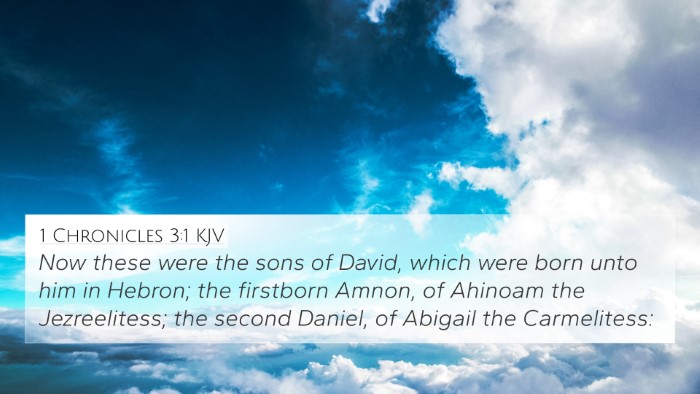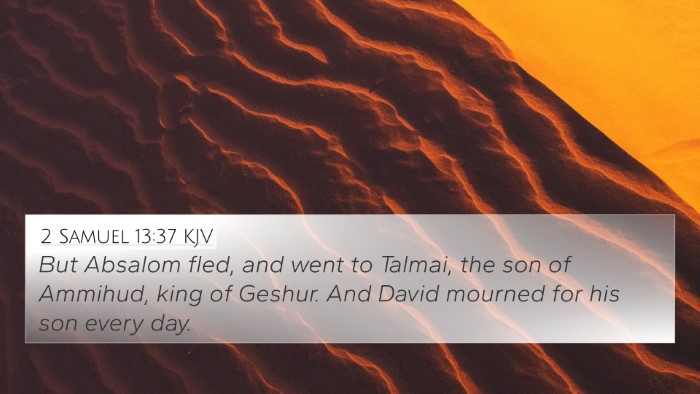Understanding 2 Samuel 3:3
2 Samuel 3:3 states: "And his second, Chileab, of Abigail the wife of Nabal the Carmelite: and the third, Absalom the son of Maacah the daughter of Talmai king of Geshur." This verse provides insight into David's lineage and the political alliances formed through marriage, reflecting the complex dynamics of royal family connections in ancient Israel.
Overview of the Verse
In this passage, King David takes multiple wives, which was a common practice among kings of that time to solidify political alliances. Here, it mentions three sons, highlighting not only the importance of progeny in royal succession but also the implications of each familial connection.
Significance of David's Marriages
-
Political Alliances: David's marriage to Abigail (formerly Nabal's wife) illustrates the tactical decisions made by leaders to strengthen their claims and influence, a theme resonant in both the Old and New Testaments.
-
Royal Lineage: The verse emphasizes the connections between families and tribes, a recurring biblical theme exemplifying the importance of lineage as addressed in Matthew 1:6-16, where Jesus’ genealogy is traced.
-
Cultural Context: These marriages reflect the broader cultural practices in the ancient Near East, where marriage was often used as a means of political empowerment, as shown by the bond between David and Maacah's family ties.
Cross-References
This verse connects with several others throughout the Bible, illustrating various themes of lineage, marriage, and political maneuvering. The following references can enrich understanding:
- Matthew 1:6-16: The genealogy of Jesus, highlighting royal lineage.
- 1 Samuel 25:39-42: Story of David and Abigail, providing context to David's marriage.
- 2 Samuel 13:1-3: A deeper look at David's children and their complicated relationships.
- 1 Kings 1:5: Further reference to Absalom and the implications of his actions as a son of David.
- Genesis 21:12: God’s promise to Abraham regarding Isaac and lineage themes.
- 2 Samuel 7:12-13: David's dynasty promises in relation to his heirs.
- Proverbs 17:6: A reflection on family ties and the significance of children.
Thematic Connections
Through comparative Bible verse analysis, we can see how 2 Samuel 3:3 connects with broader biblical themes:
-
Lineage and Legacy: The importance of bloodlines not only in establishing kingship but also in fulfilling prophecy, seen in connections to Jesus’ lineage.
-
Power and Influence: David's marriages illustrate the use of personal connections to enhance political power, prompting inquiries into modern implications of personal relationships in leadership roles.
-
Inter-Biblical Dialogue: The examination of how marriages were seen across scripture illuminates God’s broader plans through generations, revealing God's sovereignty in human affairs.
Conclusion
2 Samuel 3:3 captures more than a simple genealogy; it embodies the intricate web of relationships that defined Israel's political landscape. By examining this verse through the lens of various commentaries and cross-references, one can appreciate the significance of these connections in biblical history and their implications today.
Tools for Study
For anyone interested in deeper study, consider utilizing a Bible concordance and a Bible cross-reference guide to explore more examples of how biblical verses relate to one another. Tools for Bible cross-referencing can be invaluable for understanding relationships within scripture.















